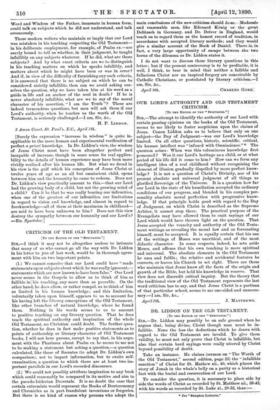CRITICISM OF THE OLD TESTAMENT.
[To THE EDITOR OF THE "SPECTATOR."] SIR,—I think it may not be altogether useless to intimate that many of us who cannot go all the way with Dr. Liddon in his letter to you of last week, would be in thorough agree- ment with him on two important points.
(1.) We cannot conceive that our Lord could have "made statements upon subjects about which he was really ignorant,— statements which are now known to have been false." Our Lord never seems in the Gospels to allow us to think of him as fallible in his teaching, any more than as peccable. On the other hand, he does allow, or rather compel, us to think of him as limited in his human knowledge; and this limitation, voluntarily taken upon himself, appears to us to account for his having left the literary conceptions of the Old Testament, like other branches of natural knowledge, where he found them. Nothing in his words seems to us to amount to positive teaching on any literary question. That he does teach the spiritual authority and inspiration of the whole Old Testament, no Christian could doubt. The further ques- tion, whether he does in fact make positive statements as to points of authorship or literary character of Old Testament books, I will not here pursue, except to say that, in his argu- ment with the Pharisees about Psalm cx. he seems to me not to be making a statement but asking a question,—a question calculated, like those of Socrates (to adopt Dr. Liddon's own comparison), not to impart information, but to excite self- examination, a question to which there are at least two im- portant parallels in our Lord's recorded discourses.
(2.) We could not possibly attribute inspiration to any book which could reasonably be compared in its motive and aim to the pseudo-Isidorian Decretals. It is no doubt the case that certain extremists would represent the Books of Deuteronomy and Chronicles as in part fraudulent inventions or forgeries. But there is no kind of reason why persons who adopt the
main conclusions of the new criticism should do so. Moderate and reasonable men, like Edouard Konig or the great Delitzsch in Germany, and Dr. Driver in England, would teach us to regard them as the honest record of tradition, in accordance with accepted literary methods ; and they would give a similar account of the Book of Daniel. There is, in fact, a very large opportunity of escape between .the two horns of the dilemma as Dr. Liddon states it.
I do not want to discuss these literary questions in this letter; but if the present controversy is to be profitable, it is well, I think, to bear in mind that neither a fallible and fallacious Christ nor an inspired forgery are conceivable by Catholic Christians, or postulated by literary criticism.—I am, Sir, &c.,


































 Previous page
Previous page